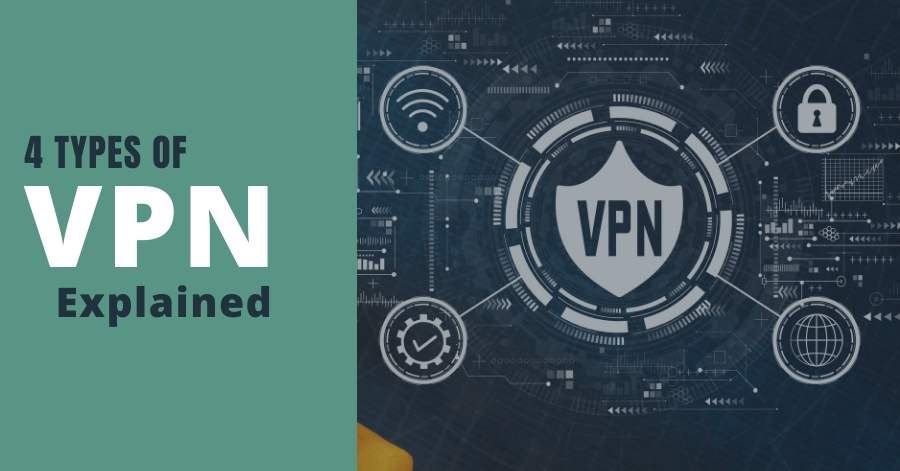The concept of VPN (Virtual Private Network) is becoming more familiar to people since internet usage has skyrocketed and users are looking for ways to become anonymous online. According to Dataprot, one-third of all internet users have used a VPN service at least once.
In addition to individual users, companies are also embracing VPNs to protect their databases and encrypt sensitive data. CloudWards argues that 68% of online businesses either started using VPN solutions or increased their VPN usage after the pandemic.
However, it is important to note that VPNs are not a single service based on a one-for-all principle. In fact, there are four main types of VPN services that differ in deployment and use purposes. We listed these VPN versions to provide you with a guideline when choosing the most suitable VPN service.
What is a VPN service?
The term VPN stands for Virtual Private Network. It’s a cybersecurity measure taken by individuals or companies that want complete anonymity and privacy on the internet.
Virtual Private Network services mask your local IP address and give you a new, impossible to trace IP address. This IP address encrypts your activities and communications online, masks your activities so that they are not followed by malicious users.
Some VPN services also allow you to control your network and decide who can get in and out. These give you the power to ensure all the data and file transfers are encrypted, protected, and anonymous to other users on the internet.
In essence, VPN services are precautions for increasing cyber-attacks that threaten sensitive data theft, cause unauthorized access to private networks, and result in legal issues for companies. It’s the most widespread cybersecurity measure in the world as they’re accessible to both individual users and web-based businesses.
1-) Cloud VPN
Cloud VPN services are the most used type in today’s digital world. This type of VPN is operated on the cloud and allows users to connect to international servers. Individual internet users who want to be completely anonymous online usually prefer this VPN service.
Cloud VPN providers allow individual users to access websites and networks that are blocked in their own country. They temporarily change users’ IP addresses to provide access to these websites by giving them IP addresses of other countries.
This type of VPN is the most widespread method commercially since it is easy to acquire, doesn’t require any hardware, and is affordable. They are perfectly capable of encrypting users’ data, providing them with a private, anonymous network in exchange for small prices.
There are various cloud VPN solutions both for enterprises and individuals. They provide the same level of security that hardware-based VPNs do while costing much less. It’s easy to say that cloud VPNs are one of the most user-friendly VPN types on the market.
2-) Site-to-site VPN services
Site-to-site VPN services create a private, protected and encrypted connection between two or more websites or networks. These VPN services are mostly used by big companies with several branches. They prefer these services to ensure protected and encrypted communications between branch networks.
Site-to-site VPN services are also great if a company has departments or branches in other countries. Despite the geographical distance, these services can provide secure communication between corporate branch networks.
Since they allow remote access to corporate branches, this VPN type can be confused with remote access VPN. However, remote VPNs give masked IP addresses to the users only temporarily. Site-to-site VPNs are permanent and allow protected communication to specific networks only.
3-) Remote access VPN
Remote access VPN services are currently one of the most popular VPN types due to the increased popularity of the remote work model. These VPN services allow remote employees to securely connect to corporate networks and services from anywhere.
They operate in the cloud, thus, a remote access VPN is not limited geographically unlike its hardware-based counterparts. This VPN type creates a private tunnel between corporate resources and the remote employee to allow both parties to transfer information safely.
The private tunnels created by remote-access VPNs are virtually invisible to outside sources and cybercriminals. Even if they are hacked, these services encrypt all the data transfer so that the hacker doesn’t get more than an impossible-to-solve puzzle.
Remote-access VPNs are great for companies with remote employees who access corporate resources from public Wi-Fi, untrusted connections, or their own devices that are not traced by the company. These VPN services provide your company with a secure gateway that only your teammates can get in, so all activities are protected from outside threats.
4-) Mobile VPNs (mVPN)
Remote-access VPNs are great for the protection of remote employees. However, while they can provide secure access from untrusted connections, they turn off the tunnel when the user disconnects from the said connection.
That’s where mobile VPNs come into play. Mobile VPNs allow users to stay on the private network even if their connection is not stable or changed. Mobile VPNs don’t cut off the access even if the user is completely disconnected; when they get back online, access to the private network continues uninterruptedly.
This VPN type is a great option for users who constantly change their Wi-Fi or who have unstable connections. However, since they always keep access to the private network, this might not be the best option for networks that contain strictly confidential data.
Conclusion
Virtual Private Network (VPN) services are one of the easiest and most affordable ways to ensure online security. It is available for both personal and business use as new VPN providers appear every day with effective and budget-friendly options.
However, VPN is not a single, uncategorized service. Instead, it has several types best suitable for various purposes such as personal use, remote connection, or corporate network protection.
Check out these VPN types to find the best possible solution for your needs. But remember, a VPN service is always a must in a digital world full of cybercriminals and threats.
